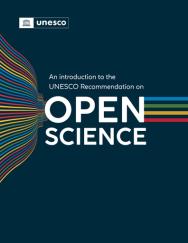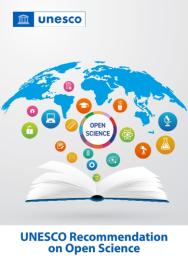
UNESCO Recommendation on Open Science
Open science is a set of principles and practices that aim to make scientific research from all fields accessible to everyone for the benefits of scientists and society as a whole. Open science is about making sure not only that scientific knowledge is accessible but also that the production of that knowledge itself is inclusive, equitable and sustainable.
The UNESCO Recommendation on Open Science provides an internationally agreed definition, as well as a set of shared values and guiding principles for open science. It also identifies a set of actions conducive to a fair and equitable operationalization of open science for all at the individual, institutional, national, regional and international levels.
About open science
Open science has the potential of making the scientific process more transparent, inclusive and democratic.
Open science:
increases scientific collaborations and sharing of information for the benefits of science and society;
makes multilingual scientific knowledge openly available, accessible and reusable for everyone; and
opens the processes of scientific knowledge creation, evaluation and communication to societal actors beyond the traditional scientific community.
Our interconnected world needs open science to help solve complex social, environmental, and economic challenges and achieve the Sustainable Development Goals.
By promoting science that is more accessible, inclusive and transparent, open science furthers the right of everyone to share in scientific advancement and its benefits as stated in Article 27.1 of the Universal Declaration of Human Rights.
As open as possible
Access to scientific knowledge should be as open as possible, but sometimes access may need to be restricted, for example to protect human rights, confidentiality, intellectual property rights, personal information, threatened or endangered species, and sacred and secret indigenous knowledge. Open science encourages scientists to develop tools and methods for managing data so that as much data as possible can be shared, as appropriate.
A quick guide to understanding what open science is, what the recommendation is about, and how it can be used.

International standard setting instrument
The UNESCO Recommendation on Open Science provides an international framework for open science policy and practice that aims to reduce the technological and knowledge divides between and within countries. The Recommendation outlines a common definition and shared values, principles and standards for open science at the international level, and it proposes actions to support fair and equitable open science for all, at individual, institutional, national, regional and international levels.
It asks Member States to:
- Promote a shared understanding of open science and set out diverse paths to achieving it
- Develop an enabling policy environment for open science
- Invest in infrastructure and activities that contribute to open science
- Invest in training, education, digital literacy and capacity-building to support open science
- Foster a culture of open science and align incentives to support it
- Promote innovative approaches for open science at all stages of the scientific process
- Encourage international and multi-stakeholder cooperation in the context of open science to reduce gaps in technology and knowledge
The Recommendation is meant to be used by all research institutes and organizations that practice, regulate and promote science, as well as by researchers and anyone concerned with the rules, policies and ethics of science.
Until the Recommendation was adopted in 2021, there was no universal definition of open science. Some standards existed only at the regional, national or institutional levels. In adopting the Recommendation, 193 countries have agreed to abide by common standards for open science.

Values
- Quality and integrity
ensuring that science is high-quality and scrutinized by bringing together different sources of knowledge and making evaluation of scientific methods and outputs more transparent and accurate. - Collective benefit
recognizing that science is a global public good that belongs to all of humanity. - Equity and fairness
ensuring equitable, fair and reciprocal access to science for all producers and consumers of knowledge regardless of their location, nationality, race, age, gender, income, socio-economic circumstance, career stage, discipline, language, religion, disability, ethnicity, migratory status or any other grounds. - Diversity and inclusiveness
embracing diversity of knowledge, practices, workflows, languages and research topics and outputs.
Guiding principles
An agreed set of principles helps Member States uphold these values and make open science a reality.
- Transparency, scrutiny, critique and reproducibility
to reinforce the rigor of scientific results, enhance the positive impact of science on society and increase society’s ability to solve complex interconnected problems. - Equality of opportunities
to ensure that all scientists and those with an interest in science have equal opportunity to access, contribute to and benefit from science, regardless of origin or circumstance. - Responsibility, respect and accountability
to be responsible for and aware of public accountability, potential conflicts of interest, intellectual integrity and the possible social or ecological consequences of research activities. - Collaboration, participation and inclusion
to ensure that scientific collaborations transcend the boundaries of geography, language and resources, and include knowledge from marginalized communities to solve problems of great social importance. - Flexibility
to acknowledge that there is no one-size-fits-all way to practice open science and to encourage different pathways to practicing it while upholding the core values. - Sustainability
to be as efficient and impactful as possible by building on long-term practices, services, infrastructures and funding models to ensure participation of scientists from less-privileged countries or institutions.
Development of the Recommendation
The UNESCO Recommendation on Open Science was prepared through a regionally balanced, inclusive and transparent consultation process, guided by an Open Science Advisory Committee established by the Director-General of UNESCO, over two years.

